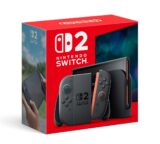FTC lawyers want more info on Microsoft’s 10 year deals with Nintendo and Nvidia
The government body also wants more information on Microsoft’s exclusivity plans

The Federal Trade Commission (FTC) wants more information regarding Microsoft’s recent agreements with Nintendo and Nvidia, as well as its exclusivity plans for content from both Zenimax and Activision Blizzard.
That’s according to new documents filed yesterday, which outlined issues the FTC has with some of the information Microsoft has presented to the governing body amid Microsoft’s proposed acquisition of Activision/Blizzard.
The FTC has requested that Microsoft produce details of the several agreements that it’s recently touted and has alleged that Microsoft intends to use these deals as a means to justify the acquisition to regulatory bodies.
“Despite clearly intending to use these agreements in its defense, Microsoft has refused to produce underlying internal documents related to these agreements, or communications with third parties other than Nvidia, Nintendo and Sony,” it wrote. “Microsoft should be not permitted to introduce or rely on these agreements without producing the requested underlying discovery.”
On Wednesday, the Xbox owner announced it had signed yet another ten-year agreement to stream Xbox PC Games, as well as Activision Blizzard titles after the acquisition closes, with Japanese cloud gaming company Ubitus.
This follows a “binding 10-year legal agreement” to bring Call of Duty to Nintendo platforms, which the companies committed to last month, as well as Microsoft’s announcement that it plans to 10-year partnership with Nvidia to bring its Xbox PC games to GeForce Now.
Microsoft appears to be using these deals as a lynchpin in its messaging justifying the deal, including claiming that should the $69 billion deal go through, Xbox will be able to offer Call of Duty to more than 150 million additional players thanks to offering the games on other platforms.
The FTC also seeks “all documents related to exclusivity of content Microsoft acquired from ZeniMax and exclusivity of content Microsoft proposes to acquire from Activision.”
ZeniMax, the parent company of Fallout and Elder Scrolls developer Bethesda, was acquired in 2021. Since the purchase, titles that were previously at least planned to be multi-platform such as Starfield, will now only appear on Microsoft’s consoles.
Earlier in March, the FTC largely denied Sony’s request to quash a Microsoft subpoena requesting that it divulge similar information regarding its third-party exclusivity deals.

The FTC is also requesting “documents related to { REDACTED}, the code name for Microsoft’s next-generation gaming ecosystem.”
Exactly what the document is referring to by “next-generation gaming ecosystem,” is unclear; it could refer to Microsoft’s future console plans, a new gaming service it plans to offer, or its cloud gaming plans going forward.
The document also requests that Activision produce several documents that were missing from the earlier phase of proceedings, such as findings relating to the relevance of cross-play to consumers, what factors affect customer purchasing decisions, and “documents relating to purported cannibalization of purchased games (“buy-to-play”) by subscription services and whether consumer behavior differs between buy-to play users and subscription service users. ”














